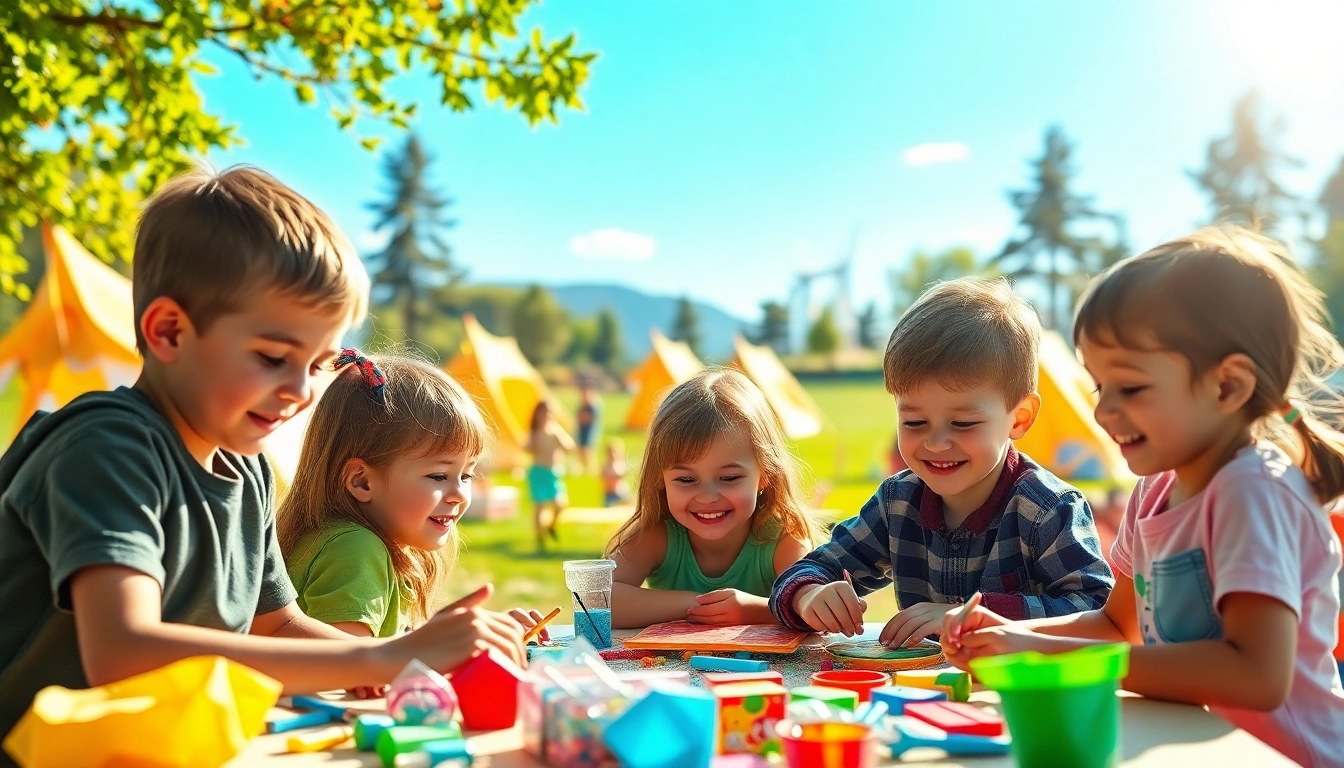Overview of Holiday Camps
Holiday camps have become an integral part of the leisure experience for families across various regions, especially in the United Kingdom. These camps offer a delightful mix of fun, learning, and social interaction during school holidays. Children can participate in diverse activities while parents can rest assured that their kids are in a safe, engaging environment. For those looking for an enriching experience for their children, holiday camps present an ideal option to consider.
What Are Holiday Camps?
Holiday camps are organized programs that cater to children and adolescents during school breaks. They typically involve a structured environment where campers can engage in a wide array of activities. This format not only serves as a means of keeping children busy and entertained but also provides them with opportunities to learn new skills, make friends, and gain confidence. Activities can range from sports and arts to educational workshops and adventure outings.
History and Evolution of Holiday Camps
The concept of holiday camps dates back to the early 20th century in the UK, primarily focusing on offering affordable vacations to working families. Initially, these camps were only seasonal and offered limited facilities. Over the decades, they have evolved significantly. Today, holiday camps are equipped with modern amenities, professional staff, and a diverse range of activities designed to cater to the interests and needs of children from various backgrounds. The shift toward a more experiential learning environment has helped these camps thrive and adapt to changing family dynamics.
Common Features of Holiday Camps
Holiday camps often share several key features:
- Age-appropriate Activities: Camps tailor their offerings based on the age groups of campers to ensure safety and engagement.
- Structured Schedule: Most camps operate on a structured timetable that includes various activities such as sports, arts, educational workshops, and recreational play.
- Social Interaction: Camps facilitate social skills development through group activities and collaborative tasks, encouraging teamwork and friendships.
- Experienced Staff: Qualified personnel who are trained to work with children lead activities, ensuring a safe and supportive environment.
Activities Offered at Holiday Camps
The variety of activities offered at holiday camps is often what makes them attractive to both parents and children. Below, we delve into some of the most popular activities campers can engage in.
Creative Arts and Crafts
Creative arts and crafts sessions at holiday camps enable children to express themselves artistically while developing fine motor skills. Activities might include painting, pottery, sculpture, and various DIY projects. These sessions promote creativity, allowing children to explore their imagination while also emphasizing the importance of patience and attention to detail. For instance, a simple painting project can evolve into a lesson on color mixing, while pottery can teach patience and spatial awareness.
Sports and Adventure Activities
Physical activity plays a crucial role in the well-rounded development of children. Sports such as soccer, basketball, swimming, and even hiking are commonly included in holiday camps. These activities not only promote physical health but also instill values such as teamwork, resilience, and sportsmanship. Adventure activities such as climbing walls, obstacle courses, and zip-lining offer thrilling challenges that can boost a child’s confidence and willingness to take risks in a controlled setting.
Educational Workshops
In addition to traditional fun, many holiday camps incorporate educational workshops where children can learn about various subjects. This could include STEAM (Science, Technology, Engineering, Arts, Mathematics) initiatives, environmental conservation activities, or coding and robotics classes. These workshops are aimed at igniting curiosity and encouraging problem-solving skills, shaping a child’s educational journey well beyond the conventional classroom.
Benefits of Attending Holiday Camps
Participating in holiday camps can yield a host of benefits that contribute to children’s overall development.
Social Skills Development
One of the primary benefits of holiday camps is the enhancement of social skills. Away from home, children interact with peers from diverse backgrounds, which helps them develop essential interpersonal skills. They learn to communicate, cooperate, and empathize with others. These interactions serve as an excellent foundation for building relationships and navigating social situations in the future.
Physical Fitness and Health
Another compelling advantage of holiday camps is their focus on physical health. With obesity rates on the rise, instilling healthy habits in children at a young age is crucial. Holiday camps encourage active lifestyles through structured physical activities, promoting cardiovascular fitness and muscular endurance. Regular participation in these activities can also lead to better mental health, as physical activity is linked to improved mood and reduced anxiety.
Emotional Well-being and Confidence
Engaging in various activities helps build self-esteem. As children accomplish tasks, whether they succeed in sports or create art, they gain confidence in their abilities. This newfound self-assurance extends beyond the camp experience and can significantly impact their willingness to try new things and take on challenges later in life. Additionally, being in a supportive, fun environment greatly influences their emotional well-being.
Choosing the Right Holiday Camp
Selecting the ideal holiday camp involves several considerations that cater to the unique needs and preferences of both the child and the parent.
Factors to Consider
When choosing a holiday camp, parents should consider the following factors:
- Location: Proximity is important, as parents need to ensure convenience when dropping off and picking up their children.
- Budget: Review the costs associated with the camp and what is included in the fees to avoid hidden expenses.
- Activities Offered: Ensure that the camp provides a range of activities that align with your child’s interests.
- Staff Qualifications: Verify the qualifications of the camp staff to ensure children will be supervised by capable professionals.
- Reviews and Testimonials: Look for feedback from parents and former campers to gauge the camp’s reputation and quality.
Top Rated Holiday Camps
Some of the most renowned holiday camps are listed below, known for their exceptional offerings and positive feedback:
- YMCA Camps: Known for their strong emphasis on community and character development.
- Camp Sunshine: Focused on providing memorable experiences tailored to children with specific needs.
- Adventure Camps: These camps typically emphasize outdoor activities and fun learning experiences.
- Creative Expression Camps: Focusing on arts and crafts, these camps enhance creative skills and collaborations.
How to Prepare Your Child for Camp
Preparation is key to a successful camp experience. Here are some strategies for parents:
- Discuss the Experience: Talk to your child about what to expect. Sharing stories can help ease nerves.
- Pack Together: Make packing a fun activity. Ensure your child helps select clothing and personal items.
- Set Goals: Encourage your child to set personal goals for what they want to achieve or experience at camp.
- Promote Independence: Encourage your child to take small steps towards independence by letting them handle their own backpack or schedule.
Testimonials and Success Stories
Understanding the real-world impact of holiday camps can be powerful. Below, we share some testimonials and success stories from parents and children alike.
Parents’ Experiences
Many parents have noted the transformative effect holiday camps have had on their children. For example, one mother shared how her shy daughter became more outgoing and adventurous after attending a camp focused on team building and confidence. Parents frequently highlight how their children come home with new skills and friends, leading to lasting relationships beyond the camp experience.
Children’s Perspectives
Children often recount their camp experiences with excitement. Many mention new skills acquired during fun storytelling sessions or the thrill of outdoor adventures. For example, a young boy expressed how learning to fish made him feel accomplished and proud. The feelings of camaraderie and support from camp staff and peers further enhanced their experiences.
Long-term Impact on Children
Studies suggest that the skills learned at holiday camps extend far beyond the campgrounds. Children who participate in these programs frequently demonstrate greater adaptability in social environments and improved emotional regulation. Over time, the friendships formed and the confidence gained empower them to navigate life’s challenges effectively.



